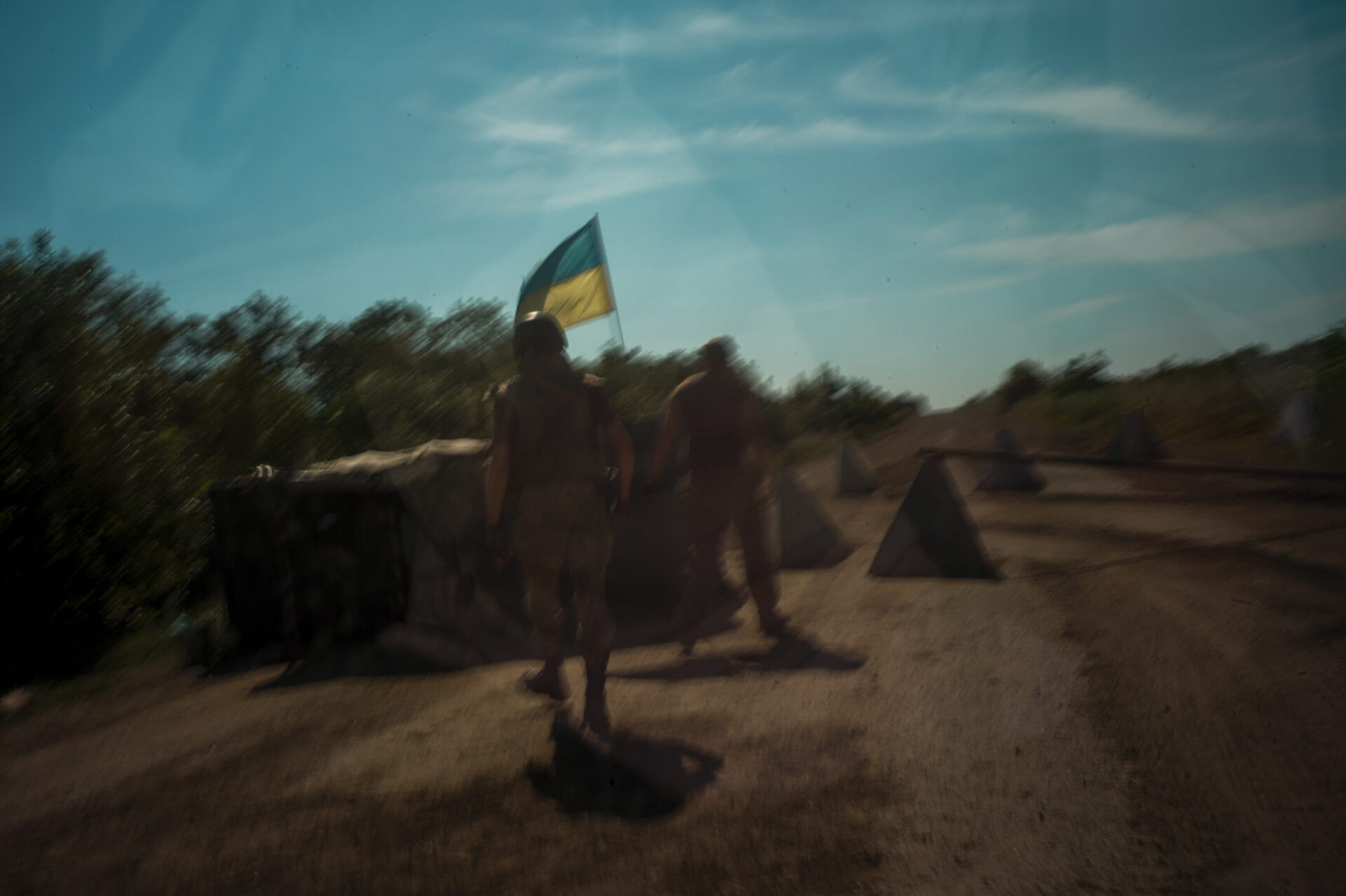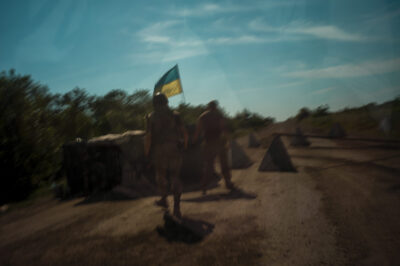Pavla Holcova (Investigace) 2017-10-14
Pavla Holcova (Investigace) 2017-10-14
Alexander Usovski was active in the Visegrad region, set up foundations, looked for EU grants, finally received money from Russia in cash, without leaving any paper trail. That’s how he started to organize a network of dutiful and useful people. And indeed, everything went just the way his sponsor wanted.
The case of Alexander Usovsky, a Belarusian-born activist, is the first so thoroughly documented example of Moscow’s foreign policy. VSquare.org analyzed his activities, contacts and leaked data to see what he was doing in V4 for Russian money. Our report shows sources of his financing and explains who is answering to Kremlin’s propaganda puppet masters. And how it makes use of radical nationalists.
The analysis of the „Usovsky archive” makes it clear that the activist was receiving Russian financing for anti-Ukrainian actions, mostly demonstrations and happenings. He was most active (and most effective) in Poland, but he also worked in other V4 countries: Hungary, Czech Republic and Slovakia. Usovsky operated very effectively: he would quickly find the right people in each of those countries, give them tasks, transfer money and watch over more or less successful execution of said tasks. This is the second part of our report, you will find the first one here.
Polish nationalists at Russia’s service
On September 20th, 2014 Polish nationalists organized an action at the Ukrainian cemetery in Hruszowice. That is – the nationalists organized the brawl, but it was Alexander Usovsky who orchestrated the whole event. Later, Usovsky wrote a report and sent it, along with photos, in an e-mail to Elena Sharoykina (she was Usovsky’s assigned contact) who worked with a Russian businessman, Konstantin Malofeev (more about him in Part 1 of the story): „The boys from Falanga organization went to the cemetery and set up photographs of children who were murdered by Bandera followers in 1943 in Volhynia, and of children killed by Bandera followers killed in 2014 in Donbass. They also painted a graffiti on the monument [in the cemetery].”
The tasks ordered by Usovsky included: collecting „blood-stained” children’s clothes for Petro Poroshenko; waving Ukrainian flag dipped in red paint; calls to „Stop the war in Ukraine!”. Demonstrations took place in Warsaw, Lublin, Cracow and at Hruszowice cemetery.
Before one of the demonstrations, Usovsky sent Wojciech Wojtulewicz (his Polish contact, at that time connected to Obóz Wielkiej Polski – OWP, the Camp of Great Poland; more about him in Part 1) a speech he wanted to be read during the rallies in Poland. The message was clear and simple: „The government in Kiev is made of murderers”. And indeed, everything went just the way the „sponsor” wanted.
‘I asked Usovsky myself, which way he’d like it to go. He sent me the speech and I translated it,’ admits Wojtulewicz. Similar modus operandi applied to the letter to Petro Poroshenko, sent to him by the Camp of Great Poland. They also received the original from the East.”
Documents leaked from Usovsky’s computer also confirm that he was sending Western Union transfers to a member of the Camp of Great Poland: $100, $130, $300 – and those are just from August 2014. In exchange, the representative of the Camp of Great Poland would report on what the organization has managed to achieve.
Usovsky also had to report to his sponsor. He would inform Elena Sharoykina about completed task. Below we quote extensive excerpts from an e-mail titled „Report on mass social-political actions carried out in Eastern Europe between 23.08.2014 and 21.09.2014”. The report reflects Usovsky’s style – it shows directions of his work and attaches links to articles and videos that illustrate each brawl (this is a shortened and translated version of it):
We’ll edit that later
Usovsky’s report – chaotic, amateurish and messy – needs explanation. The turnout is significantly exaggerated – almost every time. Some actions, such as sending blood-stained children’s clothes to Petro Poroschenko (Warsaw, September 1st, 2014) were so unprofessional they looked almost like a satire. The statement was read by a man wearing sunglasses: he made a mistake during the speech and said: „We’ll edit that later”; some people threw clothes into a box. The meaning of the whole event was elusive at best.
The video recorded in Lublin on 6th September was made with a smartphone. The quality was too low for TV purposes, one could hear drunk people yelling in the background, and the information about the events „gathering a lot of media attention” was a lie. It is clear that Usovsky likes to take advantage of actions organized by others. It seems that this was the case on September 19th in Warsaw. Sometimes his plans turned out to be complete failures. He was to carry out a task in Budapest, but due to his lack of resources he had to send Wojtulewicz from Poland with two other men. He reported that it was a youth group led by Wojtulewicz (who was well into his 60s).
The protest which took place on August 24th 2014 in Hradcany (Prague) was not really covered by any of mainstream media – mostly just by those pro-Kremlin.
A demonstration which was supported by Usovsky in Bratislava on September 19th 2014 also wasn’t very successful with only a couple of people attending.
What was the sponsor’s reaction? At the beginning, Sharoykina was pleased, but over time, her initial enthusiasm wore thin. She felt the actions were not well prepared – sometimes the execution was so bad that she considered it would be an embarrassment to show the results on Russian TV. She was clearly expecting better turnout and coverage. Ten-odd to several dozen faces appearing over and over again was not enough. Malofeev’s associate started to reproach Usovsky for not delivering. She was also mentioning the car that their „influence agent” bought himself with Malofeev’s money.
It started to dawn on Usovsky that he was about to lose his source of funding. He started to look for new sponsors – aiming high, with some success. He managed to get in touch with Konstantin Zatulin (described in Part 1). Usovsky tried to get money from the state-funded Russian Institute for Strategic Studies. He messaged Kremlin officials: Vladislav Surkov and Dmitry Peskov.
On April 23rd 2013 Usovsky contacted major Russian companies that were partially owned by the Russian government: Rosneft, Aeroflot, AFK Sistema. He asked for financial support of his project “Russkiy Mir 2020”. He established contact with Igor „Strelkov” Girkin, and received funding from him. He bragged about his Polish contacts to everyone and had proofs for that. Examples? He translated an interview with Malofeev – and the translation happened to appear on a few minor nationalist websites (e.g. Neon24, Konserwatyzm.pl, Marucha blog or Facebook profiles)
Usovsky was making a lot of effort: he wanted to convince Malofeev’s people to keep on funding him, while showing off what he could do. And the truth was, he couldn’t do that much – the websites he worked with were right-wing platforms with very modest reach. In his reports, he kept mentioning Dawid Hudziec (whom he called „my Polish guy”) who is currently in Donbass. Hudziec works for separatist media – Usovsky insisted that it was him who sent Hudziec there. We asked Hudziec for a comment:
‘I wasn’t sent here by anyone,’ he said.
When asked by Newsweek Polska whether he took any money from Usovsky, Hudziec wrote:
‘Over the past three years I have received several dozen [money transfers] to support my reporting activities. All those transfers were sent from private persons.’
When Mateusz Piskorski registered his pro-Kremlin Zmiana party in Poland, Usovsky wrote to Moscow’s offices. He insisted that he would make better use of Russian funding. He could start a better party himself, because Piskorski was „no leader”. Badmouthing Piskorski didn’t stop Usovsky from seeking funding to get Piskorki out of jail once Polish politician got arrested. Usovsky came up with an idea to start a Committee for Defense of Political Prisoners. How much would it cost? Merely 34.000 euros.
How’s my Polish? Fluent!
Another offer from Usovsky’s price list: a pro-Russian information network made of several dozen websites – €269.000. Put ten pro-Russian, right-wing MPs in the Polish Parliament? Roughly a million euros. Everything came with a price tag: Usovsky could make Poland leave NATO, bring Kremlin supporters into the Parliament. He swore he could make deals with Kukiz’15 or PSL (Polish People’s Party), even though it turned out that nobody in those parties ever heard of Usovsky before. All he needed was just several tens of thousands of euros. Sometimes a few hundred thousand. In his e-mails, Usovsky was keen to mention his connections with PSL and Paweł Kukiz (the leader of Kukiz’15 party). We asked politicians from those parties, but nobody recognized Usovsky’s name. When messaging his potential sponsors, Usovsky also told tales of his friendship with Janusz Korwin-Mikke, a right-wing MEP. When asked about Usovsky, Korwin-Mikke didn’t recognize the name. Usovsky himself also denied the friendship during our telephone conversation.
Which is surprising, because according to vsquare.org, Usovsky did an interview with Korwin-Mikke – the questions were passed to the MEP through Lilija Moshechkova, who is Russian and a member of Korwin’s political party. Moshechkova was responsible for organizing Korwin’s visit to Crimea during its Russian occupation.
In 2016 and 2017 the ground under Usovsky’s feet started to crumble. The final nail in the coffin was the attack of Ukrainian hackers – Usovsky was out. He went to Vitebsk, a small city in Belarus, and has stayed there for good. Newsweek Polska’s journalist Marta Tomaszkiewicz managed to talk to Usovsky on the phone:
‘Have you ever been receiving any money from Zatulin and Malofeev?’‘No! That’s not what we were supposed to talk about.’
‘Do you know Dawid Berezicki?’
(Usovsky sighs impatiently)
‘I know everyone I work with, all my brothers in arms. They are all wonderful people.’
‘You know him personally?’
‘I know over a thousand Poles, I studied in Poland, I’ve been to Poland a hundred times, I have a lot of contacts in Poland, I know Poland better than I know Russia.’
‘Were you paying Berezicki and Wojtulewicz?’
‘I won’t comment on that!’
‘Do you speak Polish?’
‘Yes, of course (Usovsky smoothly switches to Polish). But why do you want to hear me speak Polish? This is crazy, very crazy. Goodbye, bye.’
Who are you, Mr. Usovsky?
Alexander Usovsky is an ambiguous figure. We know for sure that he served in the USSR Air Force communications unit. Straight after leaving the army he went to Poland for a student internship. Afterwards, there is a black hole of sorts in his biography – trade business. Usovsky got so absorbed with his business that he only managed to graduate in 2004. Did he work just in trade? Hard to tell – his suggestions about „fighting for his own money”, and mentions of a friend who died in combat in former Yugoslavia suggest that he might have been busy with other activities as well.
Usovsky’s friendships and contacts were defined by his nationalist views – he doesn’t consider them preclusive or something to be ashamed of. Quite the contrary – he got to have a promotional event for his book organized in the State Duma in Moscow thanks to his activities in the neo-Nazi NSO party and to writing articles for some party newsletters. His then-boss was an assistant to a Duma deputy.
Usovsky’s social circle is a particular one: it consists mostly of national socialists, current or former members of neo-Nazi parties, pan-Slavists, neo-imperialists. Many of them were connected through one common episode throughout their lives: defense of the „White House” during a 1993 siege of the armies loyal to the president Boris Yeltsin (more in Part 1). They shed blood in the White House, then they served time in Lefortovo prison. That united them.
All rebels were released after 5 months of prison time thanks to the general amnesty. Could it be that someone in Russia offered them a deal: „Work for Russia, but outside Russia. Don’t get involved in its internal affairs”? This could explain why so many Russian nationalists got involved in Ukraine, Transnistria, Abkhazia or Ossetia.
Some of their initiatives have been without doubt funded by the Russian government, but many have been sponsored by the oligarchs, who do it for patriotic reasons, but also to appease Kremlin. Their generosity is a clear message to the government: „No need to bother us. We are giving money to those organizations after all, aren’t we?”. This buys them peace of mind and a friendly environment for their businesses.
Perhaps that’s what Malofeev was hoping for when funding Usovsky’s endeavors?
Usovsky set up his foundation in Bratislava. The foundation was fictitious and didn’t do anything at all, but looked decent enough on paper. Usovsky’s dream was to receive EU grants for his foundation’s work – and were he more disciplined, he might have gotten some. This would create a paradox: EU would be funding its own adversary: Russkiy Mir and its propaganda of the war in Ukraine.
Despite the efforts, Usovsky managed to find funding just in Russia. He would receive the money in cash, without leaving any paper trail. The money went to Usovsky – a man from nowhere with limited resources. And yet he managed to organize a network of dutiful and useful people.
His budget was rather small, especially after having spent a large chunk of his budget on a car. He didn’t travel to Poland – everything was controlled remotely online. He paid „his people” in the simplest way: through Western Union. Despite all those shortcomings, the system was working and nobody in any of the V4 countries could sense that something was off. Usovsky’s actions took place over the course of many months. They were not too effective, but Russian TV had something to show.
We know where Usovsky was looking for sponsors – in the organizations that were in-between private and state business. He was certainly funded by Girkin. Who else gave him money? We can’t be sure, because this time Usovsky managed to be more discreet. However, it is obvious that his sources of funding were limited and his run for money – continuous and ruthless, as proven by his fight for sponsors with Zmiana party. The money was necessary – Usovsky didn’t need it just for himself but also to pay those who helped him find sponsors (as implied in Usovsky’s correspondence with his wife).
Usovsky’s modus operandi was very simple – almost primitive. He wasn’t too effective himself: didn’t have many contacts and was prone to exaggerate. Despite all those shortcomings, he managed to do his work in four EU countries, none of which tried to stop him.
It is frightening to imagine what could happen if the money went to someone more efficient.
Polish journalist, co- founder of Fundacja Reporterów (Reporters Foundation). Worked as foreign correspondent covering Russia, former head of investigative desk at Dziennik daily. Based in Warsaw.
A Czech journalist, Pavla Holcová is the founder and editor-in-chief of the Czech Center for Investigative Journalism. She is an editor at OCCRP and a member of ICIJ. She was a John S. Knight Fellow at Stanford University (2023). Pavla is the winner of the ICFJ Knight International Journalism Award and, with her colleagues Arpád Soltész and Eva Kubániová, the World Justice Project’s Anthony Lewis Prize Award. She is based in Prague.







